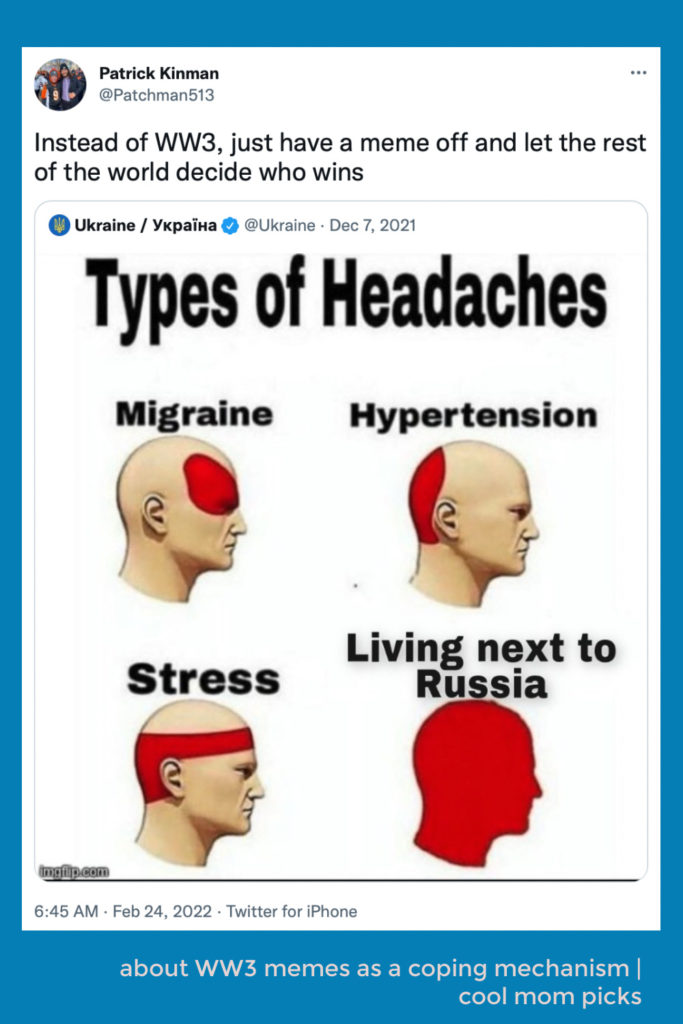This article was originally written in 2020 about the increase in tension between the US, Iran and Iraq. It was updated in 2021, with the riots in DC and violent insurrection at the US Capitol — and now, February 2022 as we watch the invasion of Ukraine live on TV, the advice here is just as relevant and helpful. So we’re sharing it again today, with a few important updates now that an actual war has broken out.
——-
In light of the increase in global tensions, actual bombings, and a full-scale military invasion, my social feeds have been packed with parents sharing similar sentiments as Asha Dornfest did on Twitter a while back: My children and their friends are sharing WW3 memes to cope with their fear and anger. I am livid. Disgusted. Furious….
Another friend’s daughter, also sharing WWIII memes, asked her mother whether there is going to be a terrorist attack in NYC where she lives.
Like it wasn’t enough just dealing with active shooter drills, the fear of gunmen in schools, the pandemic that has not yet gone away and the institutional racism and frightening increase in bigotry in many cities and states that impact so many of our kids directly.
Top image by Oliver Ragfelt on Unsplash

A meme making the rounds on Instagram. Originally shared by @enxha_ on Twitter
Whatever your feelings about the events that created this crisis — or any global crisis, in which we have little personal control if any at all — as parents, our first concerns are always our kids’ physical and mental well-being. Which is why we’re always writing here about how to have all kinds of tough conversations with your kids — from social media to sexuality to school shootings.
Still I admit we didn’t think we’d be having actual World War III conversations. But here we are.
So…deep breath. Here’s some guidance that can help, even as we process our own fears and feelings.
1. Remember that what you’re feeling right now isn’t necessarily what your kids are feeling
For those of us who lived through the 80s, we’re thinking, “here we are, terrified of nuclear apocalypse again.”
The feelings are probably a lot more intense for us; we have a more heightened sense of our mortality than our kids, and more experience with war and its aftermath. Without our same life experience, our children likely don’t have the kinds of nuclear war fears — or knowledge — that we do. (The Day After PTSD, anyone? Raising my hand here.)
We Gen X-ers grew up watching movies like The China Syndrome and Silkwood, panicking about 3-Mile Island and (the real) Chernobyl, and debating whether “the lucky ones” were those who survived a nuclear blast, or those who were instantly incinerated.
We screamed Michael Stipe’s lyrics to 1987’s End of the World As We Know It at parties, right before launching into tonight we’re going to party like it’s 1999 which also came out — you guessed it — in the 80s.
In fact, listen carefully to the sweet, prom-favorite slow dance song, Alphaville’s 1984 hit, Forever Young. I bet a lot of people assume it’s about the fear of getting old, when it’s really about coming to terms with dying in a nuclear blast.
Let’s dance in style, let’s dance for a while
Heaven can wait we’re only watching the skies
Hoping for the best, but expecting the worst
Are you gonna drop the bomb or not?
Sorry to go off on a tangent. This is just to say that a lot of us have grown up freaked out about our a strike on US soil for a long time — even before 9/11. But if you grew up in the early 2000s, you probably told dark jokes about The Twin Towers or the Iraq War. (“Mission accomplished,” amirite?)
But you won’t know how your kids are feeling and what they‘re thinking unless you talk.
2. Know that humor is healthy.
If you see your kids sharing WWIII memes, don’t scold them. It’s normal and healthy to use humor to cope. And the fact that it’s not funny to you, is in part why it’s funny to them.
 Shared by Patrick Kimnan @patchman513 in 2022
Shared by Patrick Kimnan @patchman513 in 2022
Peter McGraw, a behavioral scientist and professor of marketing and psychology at the University of Boulder published research called Benign Violations: Making Immoral Behavior Funny (PDF) that’s pretty fascinating.
He describes that humor “bestows social, psychological, and physical benefits. It attracts attention and admiration, softens criticism, delineates social boundaries, and alleviates conflict between people with different world views.”
Interestingly, it may also be possible that your kids are joking precisely because they don’t truly think it’s likely that they’ll be drafted into war, or experience an attack. In his research, McGraw also established that “for grave tragedies, lots of psychological distance is needed to render the situation harmless enough to be funny.” So maybe that’s reassuring in some way.
NOTE: A joke may just be a joke — or it could be a sign that there’s some real fear or anxiety going on. Keep an eye out to see whether your child is acting different in any way that piques that parenting Spidey sense we all have. If you need to go to a school counselor or a therapist, by all means, get help.
3. Use their memes and jokes to start a conversation.

An example of self-deprecating humor, via a now deleted account
Any parenting expert will tell you that concerns about your child are always a great jumping off point for conversation. Same goes for memes they might be sharing on TikTok, Snap, or Instagram.
If you don’t know where to start, try asking, what do you know?
This gives you the ability to use your child’s knowledge — or conversely, misinformation — to talk about the facts of the situation. And, if need be, to research them together.
4. Make sure they understand that even “jokes” can have consequences.
While you don’t want to scold your kids, it’s also important to let them know that are real people are facing real danger right now, and that their families and their entire futures are at stake. In fact, in the attack on Ukraine by Russia, we’re talking millions and millions of people, including the border countries, countries in the NATO alliance, UN Peacekeeping forces and their families, diplomats, and more that our kids may not have even considered.
Help your kids understand that sharing some memes can peg them as someone who’s clueless, uneducated, devoid of empathy, or cruel.
It may also really hurt another person in a real way — even if it’s someone they don’t know, halfway around the world.
Even other kids and young adults are calling this out.
some of y’all need to read the room,, cus the ww3 “jokes” are not funny when innocent ppl are legit gonna lose their lives
— ً (@PRODBYJlMlN) February 24, 2022
This article in Psychology Today helpfully breaks down psychological research identifying 4 different kinds of humor — they are not all created equally. Let kids know that there’s a difference between laughing at yourself and laughing at the misfortune of others who have done nothing to deserve it.
It goes back to our tips on being a good digital citizen, which includes knowing what to say online, and when.
5. Keep conversations age appropriate
What you tell your kids will depend on age and maturity. Another helpful phrase, which I recently learned from Spawned podcast guest, parenting communicator and researcher Dr. Heidi Croatt:
Well what do you think?
It’s a brilliant question to help you get right into your kids’ heads, whatever their age.
Maybe they really are terrified about WWIII. Maybe they have misinformation that needs correcting. Or, maybe sharing memes from friends is just a way to feel “cool” and part of something their peer group is doing.
We’ve got some specific tips on what to say, below.
(Psst…If you’ve got teen social media users, this is also an opportunity to find out where your kids are getting their information, or where they’re seeing those memes. As Caroline Knorr at Common Sense Media put it, assume that teens know — but don’t assume their knowledge is complete. it’s never a bad time to talk about vetting news sources, sensationalism in the media, and reminding them that TikTok memes are not the gospel truth.)
6. Be honest, but reassuring. Here’s a script for older kids.
 Photo: Hian Oliveira via Unsplash
Photo: Hian Oliveira via Unsplash
Don’t make promises you can’t keep: Don’t worry, we’re in Peoria, we’re safe here.
Instead, tell your older kids things that are true, but not terrifying. Here’s a place to start.
(With thanks in part to my friend Amy, who always has brilliant ideas for talking to kids honestly.)
Remember, there are lots of experienced people out there working on this. Their job it is to take care of these things. We have diplomats, soldiers, military leaders, scientists, and experts of all kinds all working on this together to keep us safe. That includes our intelligence agencies and even local police. That’s why you may see more police or military presence around places like ballparks or bridges — it’s just another way of keeping us safer.
Remember we have lots of allies around the world too, who also want to keep us all safe.
And you know we have the most extraordinary technology, including anti-missile defenses — some say the best in the world. We’ve spent trillions of dollars building up our arsenal in the event of an attack and the likelihood of it happening in a major American city, particularly after 9/11, is very, very low.
Also, we do not have a draft right now and there are no signs that there is much heart for one. Our military remains full of enlistees who signed up to be a part.
If you live in a big city like NY or DC, you can let your child know that there’s a lot of people looking out for credible direct threats right now, which is another truth. You can also point to any increased police or military presence as a case of “looking for the helpers.”
With older kids by the way, you can also ask, What would you like to do about it? Maybe they want to go to an anti-war rally for example, or get a backpack pin, or make a sign, or just make their own meme. It’s one way for kids, who feel like they have no power, to feel just a little more in control.
Want more?
For those of you who want to get more specific about the bigger picture around the world, you can add something like Amy’s wise words, incorporating your own values and beliefs, of course.
The truth is, there is a likelihood that our foreign outposts, which do not have our mainland defensive capabilities (plus friendly neighbors to the north and south), are vulnerable.
However our troops are being put in a terrible position, and even if this is what they signed up for, no one wants any more lives lost. The people [involved] are also in a dangerous position — they are the ones who are most likely to suffer most. Because whatever economic consequences we may face or high gas prices, it’s nothing compared with loss of life.
So there [may be] personally nothing to worry about, but everything to grieve.
Not matter what you say, as always, remind them that you love them, and that your first job as a parent is to keep your kids safe any way you can.
This is always true.
…and for younger kids
While this post isn’t geared toward kids who are too young for social media, yours may be soon enough.
This Common Sense Media guide is helpful, and breaks down what to say by age.
I like their reminder to simplify complex ideas. Don’t get into the specifics of the annexing of Crimea, or the history of the Cold War. You can say something as simple as “there’s a leader in another country who is doing a lot of bad things, and he’s trying to hurt another country. But now there are a lot of smart people all over the world, working together to try and keep everyone safe”
Or, come up with your own version. But that’s a start. You can see more on this post about how to talk about tragedy and tough topics with kids, which is full of terrific advice.
7. Tell them you love them and they can always come talk to you
This bears repeating a million times.





I’m heading back to school (as a teacher) tomorrow and just wanted to thank you for this thoughtful approach. As a high school teacher (as well as a parent of elementary students), it is a good perspective to hold as we start up our year again and reassuring to have another adult voice in my head that is saying what I’m thinking–just in case you don’t hear it as often as you should: you guys are awesome!
Wow, thank you so much for taking the time to write this comment. It means so much to know you’re finding this helpful. Sometimes it’s like we write on topics for our *own* use — it’s good to know this is helpful for you as a teacher as well.
Thank you for all of this info. A super helpful revisit to this topic in a scary time.